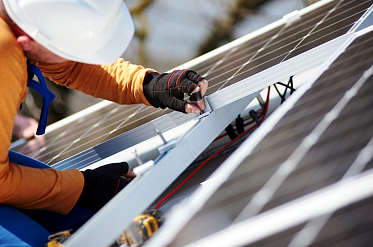Once again, the regulations are being amended to make it easier to permit small-scale solar installations.
The new building law reduces bureaucratic burdens for smaller renewable energy facilities.

The government has recently approved a new building law designed to replace the outdated 1976 Act on Land Use Planning, as well as the recently enacted Act No. 201/2022 on Construction, which is set to come into force in April 2025.
The Ministry of Transport, the proponent of the new law, argues that the implementation of Act No. 201/2022 is 'unfeasible' due to unrealistic goals and timelines. The new legislation aims to enhance, simplify, and accelerate construction processes, reduce administrative burdens, and foster transparency.
Despite the formal compliance of the 2022 Act with legal requirements, the Ministry deems its practical implementation unrealistic even within the postponed timeline.
Building contractors have expressed opposition to the proposed new building law, arguing that the preparation of a new law to replace the recently adopted construction act has halted the development of necessary detailed implementing regulations. This includes areas such as digitalization of building permits, environmental impact assessments (EIA), and other matters governed by the 2022 Act.
The Association of Slovak Construction Entrepreneurs warns that the rushed implementation of the new building law may lead to numerous practical challenges due to the need to address a multitude of details and interconnections.
Key Provisions of the New Law
The proposed law aims to streamline the permitting process by integrating administrative procedures and eliminating redundant documentation. This is expected to reduce the time required for obtaining a building permit from an estimated 300 days to 90 days.
The two-step permitting process, involving separate land use and building permits, will be merged into a single decision on the construction project.
However, the law will impose stricter requirements on developers and designers to ensure that their proposals comply with all relevant legislation and land use plans. It introduces a mandatory pre-application consultation process with the municipality, relevant authorities, and interested parties.
The new law also introduces a "deemed consent" provision, meaning that if a consulted party fails to respond within the specified timeframe (30 or 60 days), their consent is assumed.
Renewable Energy and Permitting
The permitting process for renewable energy installations is often lengthy. European legislation mandates that the permitting of new renewable energy sources and energy storage facilities be accelerated. However, Slovak regulations have yet to fully reflect these changes.
For photovoltaic systems up to 50 kW, European legislation deems that no response from consulted parties constitutes consent, provided the system's capacity does not exceed the existing connection capacity to the distribution network. Slovak legislation does not include this provision.
Another issue is the inconsistent assessment of projects by building authorities, despite guidance from the Office for Spatial Planning and Construction. In practice, some authorities still require a building permit for photovoltaic installations, even when a simple notification would suffice.
Simplified Permitting for Photovoltaics
The new building law addresses some of these issues by expanding the scope of projects that do not require a building permit and can be carried out through a simple notification.
Renewable energy facilities with a capacity of up to 100 kW are classified as minor constructions and will only require a notification. Facilities with a capacity below 50 kW will not even require a notification. Facilities with a capacity exceeding 100 kW will be classified as simple constructions.
Nuclear Facilities
The law also addresses the permitting of nuclear facilities, introducing transitional provisions to facilitate the transition from the existing to the new permitting regime.
